Today’s joyful romp through history: women SF writers whose names begin with H and who debuted in the 1970s1. There also two previous installments in this series, covering women writers with last names beginning with A through F and those beginning with G.
Vicki Ann Heydron
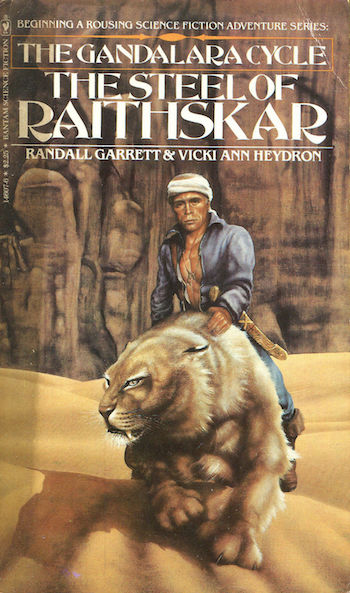
Vicki Ann Heydron wrote most of her published fiction in collaboration with her husband, Randall Garrett. Best known of their collaborations is the seven-volume Gandalara Cycle (1981–1986), in which a dying intellectual of our world is transported to a new, young body in a strange desert realm called Gandalara. Although both spouses are credited, Garrett was reportedly in a coma for much of the period in which the series was published. I rather suspect that unconsciousness would have significantly impeded active participation. Presumably, whatever Garrett’s role in plotting the series, Heydron did most of the actual writing. The Steel of Raithskar is the first volume in the series and that is where I recommend you start.
P. C. Hodgell
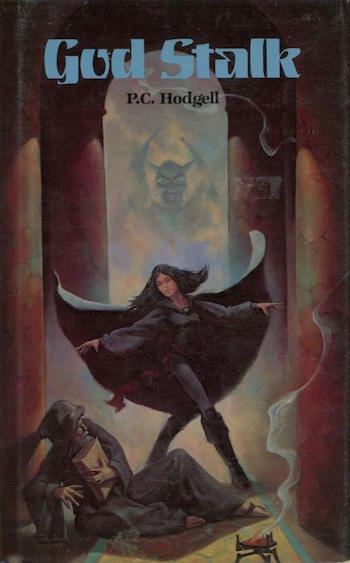
Clarion graduate P. C. Hodgell has been active since the late 1970s. She is the author of the long-running Chronicles of the Kencyrath (nine volumes since 1982). Readers of a certain vintage may have vivid memories of the twelve-year desert between the third book in the series, Seeker’s Mask, and the fourth, To Ride a Rathorn. Currently she has the active support of a publisher whose name escapes me. Since the series is continuity-heavy, you will want to start with the first volume, 1982’s God Stalk, in which an amnesiac woman of a race of staunch monotheists finds herself in a city of a thousand gods—none of whom seem to be particularly helpful gods…
Cecelia Holland
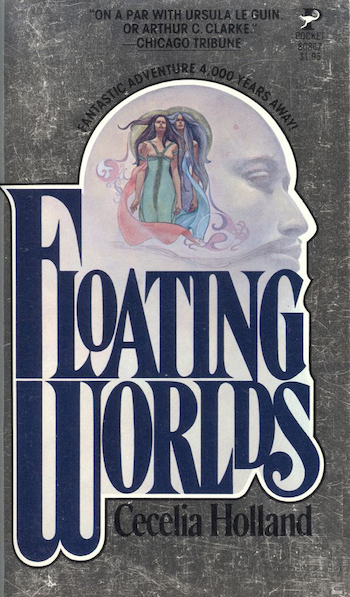
Cecelia Holland is best known as a writer of historical novels, of which there are almost three dozen. Her efforts in the SF field have included reviews and essays; she has also written at least three speculative fiction novels to date. I am a terrible person because I have thus far managed thus far to miss reading two of them. On the plus side, that does make it easier to decide which book to recommend: 1976’s Floating Worlds. In this novel, an unconventional diplomat does her best to preserve peace in a Solar System divided between Earth, Martians, and the outer planet Styths2.
H.M. Hoover
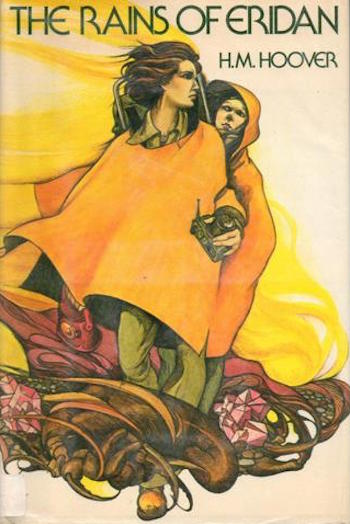
H.M. Hoover is a prolific author whose work I have mostly ignored because I aged out of her target market about the time she began getting published. In addition, for a time it was difficult to find recent editions of her work, something The Society for Preservation and Dissemination of Books We Love to Read3 is currently working hard to address. Nevertheless, I have read a few. The best of those I have read was Rains of Eridan, in which a young biologist races to find the cause of some alarming behavioural changes in an exploring party before it is too late.
Monica Hughes
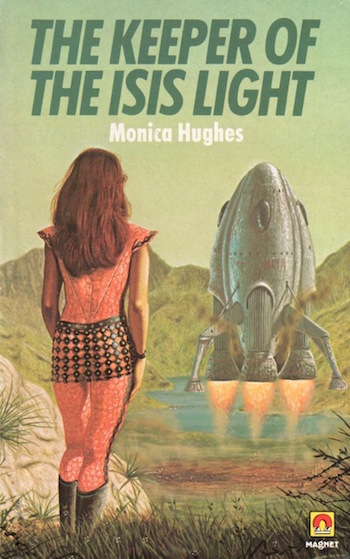
English-born and Canadian by choice, Monica Hughes was active from the mid-1970s until her death fifteen years ago. The Isis trilogy may be her most famous work. The first novel—and I think it’s pretty clear by now that I am borderline pathological about starting at the beginning when possible—is The Keeper of the Isis Light, in which a young woman, for most of her life the only human on the planet Isis, must deal with the unexpected arrival of colonists from Earth.
* * *
As to my habitual failures to be widely read, this time round they begin with Marilyn Hacker, of whose work I have been cognizant for roughly half a century. This has not, alas, spurred me to track down any of her books. Other authors of whom I am profoundly but curably ignorant include:
1: This series only covers women whose published careers began between 1970 and 1979. If their career began before 1970 or after 1979, then they fall outside my target range. Because I am concentrating on women whose surnames begin with H, I am excluding all women whose surnames begin with A through G and I through Z. For example, Jo Clayton was a fine author, but since C is not H, she is not listed here. Well, aside from this footnote.
2: Possibly not recommended for Jame Retief fans, as (unlike the late Keith Laumer) Holland is a keen supporter of the notion that women are people. I do wonder how well Floating Worlds would work as a paired review with Alan E. Nourse’s Raiders from the Rings.
3: I know nothing about the Society for Preservation and Dissemination of Books We Love to Read beyond their name and the fact they publish Hoover’s current editions. I welcome further information.
In the words of Wikipedia editor TexasAndroid, prolific book reviewer and perennial Darwin Award nominee James Davis Nicoll is of “questionable notability.” His work has appeared in Publishers Weekly and Romantic Times as well as on his own websites, James Nicoll Reviews and Young People Read Old SFF (where he is assisted by editor Karen Lofstrom and web person Adrienne L. Travis). He is surprisingly flammable.










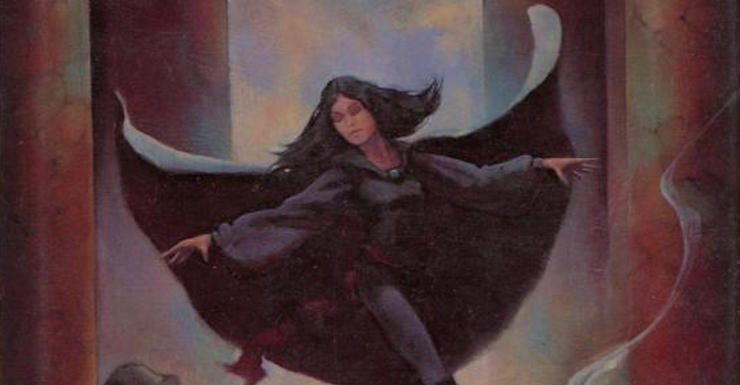
In regards to note 2: To be fair, Laumer didn’t portray most of the men in the Retief stories as people either.
While I have not read Hacker, I have had cause at the theatre where I work to repeat the anecdote about her discovery that men’s pockets are large enough to store objects in. The ushers’ shirts designed for women lack pockets, as do most women’s trousers, which means the various tools of the trade I can tuck away my co-workers are forced to carry in hand. I am frankly boggled “deny women pockets” is still a thing in 2018.
What’s even more confounding are the women’s trousers that have fake pockets. Or real pockets the maker then carefully stitched shut.
The idea is presumably that women carry purses. Except of course, they don’t all, and even the ones who do don’t always.
I am pretty sure the uniform rules preclude purses and shoulder bags on the grounds ushers would no longer be uniform in appearance. Same reason I am not permitted to wear suspenders (or as the British call them, braces) unless I can convince everyone else to wear them.
Beth Hilgartner! I loved A Business of Ferrets and its sequel, A Parliament of Owls. Fantasy world where a group of street kids ends up involved in things way over their head. Very gritty in some respects, but pro-kindness and optimistic in others. There was supposed to have been a third book in the series that I believe got caught in the Meisha Merlin implosion. I’d be delighted to buy it if she decided to self-publish it. :-)
I haven’t read any of her others.
Zenna Henderson was one of my favorites back then… 1970s… Holding Wonder was awesome.
Hoover’s Rains of Eridani has long been a favorite, partly because it absolutely evokes a love of nature, and science, even though it doesn’t offer many details. Anyone fond of Janet Kagan’s Mirabile should take a look. It is simpler..but the feel is similar.
i realize I’m in the wrong part of the alphabet, but what about Suzette Haden Elgin? I love a great deal of her work, especially the story that Joanna Russ later turned into The Two of Them.
I really need to come up with clearer phrasing for footnote one.
I am hoping tor dot com will let me reprise this series for the 1960s (the 1970s tsunami of women writers was part of something that really got going before the disco era). If so, Elgin will be covered in that series when I get to the letter E; she debuted in 1969.
I don’t want pockets that bag and drag. I like my purse.
@@@@@ James Davis Nicoll
thanks, I appreciate that.
By the way, Holland’s Floating Worlds is an Early Bird special today.
I hate pants with fake pockets. I never use a purse. Usually I end up looking in the men’s section for sensible pants. I don’t really see a difference between men’s and women’s jeans except the lack of real pockets anyway.
People who don’t read explanations in the main text aren’t likely to read footnotes.
Vik @@@@@ 6: Henderson started writing in the 1950’s. Her “People” stories have been continuously in print from NESFA for over 20 years, so she’s also not exactly neglected.
Nicoll @@@@@ 2: possibly the missing pockets reflect a uniform designed for the male gaze? If there were working pockets that women put things in, the fit/line would be altered — and the pants may be too closely-fitted to make room for anything in pockets. I wonder how many other goods are unchanged because people fear that changed forms would be unmarketable.
I was in the target market last time I read anything by H.M. Hoover, so I can’t necessarily speak to how they’ve held up, but her Another Heaven, Another Earth was a strong favorite of mine.
The Gandalara Cycle remains one of my favorite series – it saddens me a little bit when I think of how many people don’t know it, and similarly haven’t also been introduced to Lord D’Arcy.
Has Hacker written any fiction? She’s a first rate poet — I discovered her second book, SEPARATIONS, around when it was published. I don’t think I knew she was married to Samuel R. Delany at that time. I really enjoyed her poetry.
And of course she co-edited the QUARK anthologies with Delany.
But I don’t know of any fiction.
As for Holland, I love FLOATING WORLDS. But her first novel appeared in 1966.
Her historical fiction really is excellent.
Thank you for all the hard work, time, and dedication you’ve put in this truly eye-opening series. I’m enjoying it very much, and of course, discovering loads of new woman authors to add to my TBR.:)) I look forward to the next installment!
Hodgell’s work is very enjoyable.
Cecelia Holland’s Floating Worlds is a mirror image to her historical novel Great Maria. (I won’t explain in detail to avoid spoilers, but there are parallels between them, and things in one are reversed in the other.) If you like Floating Worlds, and aren’t turned off by historical novels, I recommend reading them both, especially since Great Maria is one of her best historical novels.